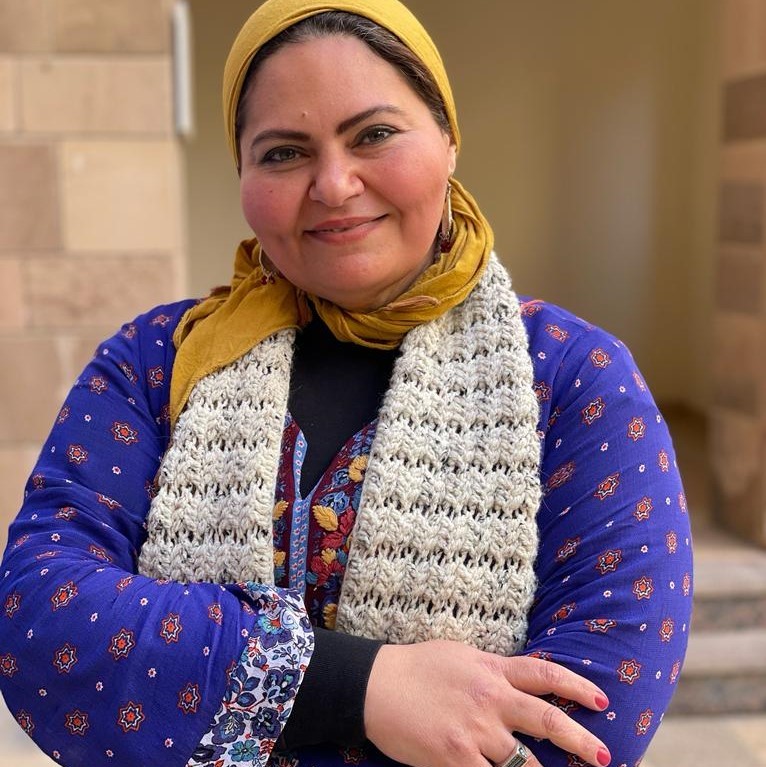In the words of Mai Hassan: “I dream that everyone is capable of understanding their own feelings and expressing them through the cooking workshop that my project offers”
Date:

Ms. Mai Hassan, an electrical engineer with a master’s degree in engineering, works as a researcher at Helwan University. Mai started her project known as “Hallet Wasl”- which means “cooking a dish to connect. Mai discovered her passion for cooking and, upon realizing that she was uncomfortable with public speaking, started using cooking as an alternative way of communication for introverts to help them express their feelings.
Mai is one of the women entrepreneurs who has benefited from the series of trainings conducted under the UN Women/UNIDO Egypt Joint Programme ‘Rabeha’, in coordination with the AUC Center for Entrepreneurship and Innovation. The programme is implemented in partnership with the National Council for Women, the Ministry of Trade and Industry and the Small, Medium and Micro Enterprise Development Agency Microscopy (MSMEDA), with the generous support of the Government of Canada.
We spoke with Mai to know more about “Hallet Wasl” and Rabeha’s impact on her project.
““Hallet Wasl” is a place for everyone, women and men, of different groups, ages and backgrounds”, said Mai. “It is aims at exploring different ways of communicating that can replace the traditional ones. One of these ways is cooking. Studies have shown that cooking together allows families to communicate, connect, and create. There are countless health benefits for cooking, which is currently known as ‘cooking therapy’. What we usually do is that we announce our topic of discussion a day ahead of the workshop, to be tackled with our participants while cooking a dish.”
“I discovered my passion when I accepted the fact that I was an introvert, uncomfortable with [public] speaking. I was often exposed to unhealthy situations and many challenges that affected my mental wellbeing. At first, I was depressed because I felt it was all my fault and I kept blaming myself. However, when I conducted some research on the characteristics of the introverts, I found out that 25% of the populations worldwide are introverts, which means that 25% of the society is unable to communicate using the traditional ways and that was the turning point in my life. I finally decided to start a project that brings these people together through cooking and named it "Hallat Wasl".”
“One of the objectives of “Hallat Wasl” is to tackle procrastination. For example, you cannot start cooking a certain dish and finish it later because it gets ruined. Cooking therapy helps people understand the idea of going through life experiences and dealing with these situations till the end, even if the result is not what you had hoped for, the main point is that you reach the end line”, said Mai.
“Cooking is also a great way to utilize all your senses. During cooking, sensory awareness is triggered by the ingredients you touch with your hand, the smells associated with cooking, the tasting of food items and the color of different fruits and vegetables.”
“I wanted to expand my project and let more people learn about it, so I started looking for donors and training opportunities for female entrepreneurs. I learned about the services offered by the UN Women/UNIDO ‘Rabeha’ programme on the AUC Facebook page. I applied and I was very happy because the criteria were not limited to a certain age, as I always believe that one’s perspective and purpose in life can completely differ after the age of 35. The trainings were accessable and practical. They gave us a chance to share our various opinions, fears and experiences. During the trainings, I learned how to set the objectives of my project and identify its target groups. I also learned about the strengths and weaknesses of my project and how to work and build on these points. Also, I was able to write a business model, which helped me move forward from the prototype stage to actual business implementation.”
““Rabeha” is a unique programme because its support is not limited to the training period. Till now we are still in contact via emails for follow ups and updates on new trainings available, including an upcoming one on marketing. Therefore, I am very grateful for this opportunity, and I will take advantage of it as much as possible. I dream that everyone is capable of understanding their own feelings and expressing them through the cooking workshop that my project offers.”